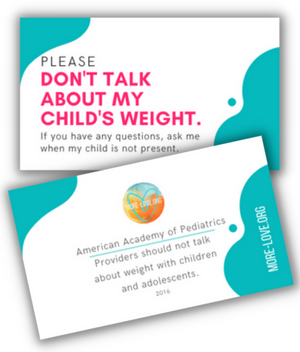
Very few medical doctors are trained in eating disorder recovery, and it is unlikely that your child’s regular physician has specific training in eating disorder treatment beyond identifying the minimum weight threshold that indicates anorexia. This means that many doctors inadvertently trigger eating disorder behaviors due to a lack of knowledge about how to treat someone who is in recovery. This lack of knowledge is not from a lack of caring. It’s just that very few doctors become well-versed in eating disorders unless specifically trained.
We can’t protect our children from a world that triggers eating disorders, but we can do something to help prevent accidental triggering from people whom we trust to care for our kids. We created a letter for you to provide your child’s medical doctors to minimize triggers at the doctor’s office. It may surprise you to know that many people in eating disorder recovery find doctors visits very triggering.
Don’t Talk About My Child’s Weight Cards
You can give these cards to the nurses and doctors at your child’s pediatrician’s office. The American Academy of Pediatrics recommended against doctors discussing weight given the high risk of weight stigma and eating disorders. You get to make choices about how your child’s weight is dealt with at the doctor’s office!
Of course, you should edit this letter to fit your circumstances. If your child is under the care of a physician for their eating disorder, definitely add that information. The goal is to provide reassurance to the doctor that your child’s eating disorder is being treated appropriately.
Please review this letter with your child’s treatment team to gain their feedback.
Dear Dr. _____________________,
My child, _______________, is coming in for an appointment with you on ___________. Before we come in, I wanted to let you know some important information.
_______________ has been diagnosed with an eating disorder. We are working closely with a psychotherapist and dietitian who are trained to work with children who have eating disorders. _______________ doesn’t physically look “sick,” or the way that most of us think someone who has an eating disorder looks.
Here are some requests we have before coming into your office. I would really appreciate it if you could share these requests with your staff to minimize any triggering events for _______________ during our visit.
Please do not weigh _______________. I would really appreciate it if your staff members do not even suggest stepping on the scale. You can probably guess that being weighed is a major trigger for _______________. If you feel that you cannot provide care without body weight, please contact me immediately to discuss this further.
Please do not comment on _______________’s appearance – positive or negative. We were surprised to find out that one of the most triggering comments for someone in recovery for an eating disorder is “you look really healthy!” We have learned that all comments about physical appearance can be difficult to handle for someone who is in recovery from an eating disorder. We have been working on saying things like “it’s great to see you again,” or “I’m so happy to see you” to replace the common greeting of “you look great!”
Please do not make any diet or exercise recommendations on this visit. Both food and exercise are a part of _______________’s eating disorder and recovery. We are working hard to support new, healthy habits around food and exercise. It’s a sensitive area right now, so it would be very helpful if we leave details about both to our dietitian at this point in recovery.
If you have any concerns about _______________’s physical health as it relates to the eating disorder, food behaviors or weight, please discuss them with me privately either before or after the office meeting so that we can work with our therapist to address them in a safe environment that will best benefit _______________’s eating disorder treatment.
I deeply appreciate your understanding in this difficult matter. I know you have a lot on your plate, and I can’t tell you how much it means to have your support!
Sincerely,

Ginny Jones is the founder of More-Love.org, and a Parent Coach who helps parents who have kids with disordered eating and eating disorders. Combining science, compassion, and experience coaching hundreds of families, she helps parents understand what’s going on with their kids’ eating behaviors and teaches them the science-backed skills to heal kids’ relationship with food, improve their body image, and feel better about themselves, their relationships, and life in general.
Ginny has been researching and writing about eating disorders since 2016. She incorporates the principles of neurobiology and attachment parenting with a non-diet, Health At Every Size® approach to health and recovery.


This is a great resource! It’s so unfortunate some if the stories I’ve heard from clients in their experiences with doctors. Thankfully I’ve always had a good ED doctor to refer kids and adolescents to in the places I’ve lived. What I’ve found to really be lacking are physicians who treat adults and know about EDs.
Hi Erin, It’s great to hear that you have a doctor to whom you can refer young clients! Thanks for commenting!